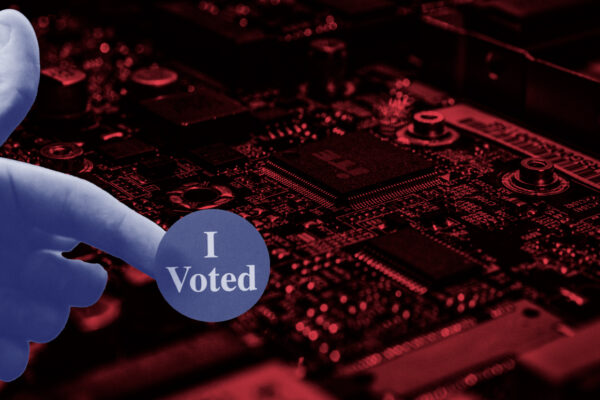The poor decision by Secretary of State Frank LaRose to leave the Electronic Registration and Information Center (ERIC), an interstate compact with the mission of helping states maintain accurate voter registration lists, could not come at a worse time. We find ourselves in a perilous moment. Election deniers across the country are turning over every stone attempting to find any reason to attack the legitimacy of our democracy, and now, ERIC is next.
What does leaving ERIC mean for Ohio? The simplest way to put it is that county and state elections officials will now need to dedicate significantly more hours and resources to conduct list maintenance and to fill the gaps created by not having access to ERIC’s data and technology. It means it will take longer for duplicate registrations, and inactive registrations to be identified and removed from the state’s voter rolls. It opens the door for election deniers to use Ohio’s bloated voter rolls as justification for further restricting how and when Ohioans can register to vote. It needlessly, and senselessly, strips away an invaluable list maintenance tool from our election administrators.
Maddeningly, ERIC has proven itself to be a valuable tool to bolster election integrity and accuracy, and until former President Trump recently spouted off unfounded accusations toward ERIC, the organization had garnered widespread, bipartisan praise. For example:
“Systems like ERIC are an important tool for election administrators and help prevent people from being registered in and trying to vote in multiple states. States that prioritize best practices and actual election integrity over politics are going to stay in ERIC and have clearer and more accurate voter rolls than those that choose to leave.” - Georgia Secretary of State Brad Raffensperger (R)
“Our participation in ERIC will decrease provisional ballots, as well as reduce the number of voters on the rolls who don’t live in Arizona anymore. Our counties work hard to ensure the registration database is accurate, and this tool will enhance their ability to keep our data as accurate as possible.” - Former Arizona Secretary of State Michele Reagan (R)
“The State Election Commission’s view is that ERIC is a valuable and currently irreplaceable tool that allows us to remove unqualified voters from the voter registration rolls.” - South Carolina State Election Commission spokesperson John Catalano
“Americans should feel pride that our elections are free, fair, safe, and secure. Organizations like ERIC have sought to bolster access and confidence in our electoral processes by facilitating secure, interstate data sharing to ensure more accurate voter rolls. There’s broad bipartisan agreement by state and local election officials that this system works and has improved our elections over the last decade. I am deeply troubled to see politics and disinformation get in the way of best practices.” - Former Kentucky Secretary of State Trey Grayson (R)
“Joining ERIC is a powerful step to strengthen New Jersey’s elections by increasing our ability to support eligible voters while also improving the accuracy of our voting rolls. This partnership will help more New Jerseyans participate in democracy while giving all our voters greater confidence in the integrity of our elections.” - New Jersey Secretary of State Tahesha Way (D)
Here are current and former elections officials from states that have recently decided to leave the organization praising ERIC:
“[ERIC] is one of the best fraud-fighting tools that we have when it comes to actually catching people that try to vote in multiple states, when it comes to maintaining the accuracy of our voter rolls by removing those that move out of state.” - Ohio Secretary of State Frank LaRose (R)
“In Alabama, ERIC is used to preserve a clean and accurate voter list and to contact eligible residents who are not registered voters…These election security measures would not be possible without our partnership with ERIC.” - Former Alabama Secretary of State John Merrill (R)
"It's easier for county clerks to be able to maintain and make sure that they don't have duplicates on their list, that someone hasn't passed and still on the list. That's why ERIC was so important." - Former West Virginia Secretary of State Natalie Tennant (D)
“While our statewide voter registration database allows us to update voter records if the voter moves or dies within Missouri, the benefit of ERIC was that it let us know if voters moved or died out of state. Leaving ERIC weakens our voter roll clean up since we’ll no longer receive timely out-of-state information.” - Boone County, Missouri Clerk Brianna Lennon
“I have heard strong support for joining ERIC from supervisors of elections all over Florida, and I am excited to provide them with one more tool to serve voters in Florida. Joining ERIC keeps Florida at the forefront of election security and will help us ensure a fair and accurate election in 2020 and beyond.” - Former Florida Secretary of State Laurel Lee (R)
So, what happened? How did a widely heralded, wonky, technical function performed by election officials from red and blue states become such a political lightning rod? After all, ERIC has been around since 2012, and at its high point had over 30 states collaborating on the critical function of maintaining our accurate voter registration lists. Organizations spanning the political spectrum like The Heritage Foundation, John Locke Foundation, Secure Democracy USA, and The Brennan Center for Justice have all vouched for ERIC, as well as the National Association of Secretaries of State. What changed?
From the limited public explanations given by the six states who have decided to leave ERIC, the answer is politics. ERIC has robust privacy and technology policies that protect voter information from coming into the wrong hands. Allegations that ERIC uses voter information improperly have been made without any supporting evidence. There is criticism from the withdrawn states regarding an ERIC policy of mailing voter registration information to “Eligible but Unregistered” citizens in their states. It’s hard to imagine that a state’s chief elections officials would bristle at the notion of encouraging eligible citizens to register to vote, but here we are. Unfortunately, most of the controversy surrounding ERIC stems from the perceived political motivations of the organization's founder and non-voting board member David Becker. However, in an attempt to ease the tensions created by his involvement, last week Mr. Becker announced he would not seek renomination to ERIC’s board. That did not convince Ohio to stay.
Adding to the frustration of Ohio leaving ERIC is that Ohio was the most recent board chair of the organization. We never heard a peep about the alleged controversies that led to Ohio leaving. The first public statement about this issue was a letter Secretary LaRose sent to ERIC Executive Director Shane Hamlin a little more than two weeks ago. If Secretary LaRose had legitimate complaints about ERIC’s internal operating structure, would it not have made sense to bring those to the public’s attention while board chair of the organization? The fact that Ohioans were first made aware of our potential departure, and then Secretary LaRose executed that departure in a three-week span undercuts the credibility of statements made alleging our withdraw was a resulted failure of extensive negotiation.
ERIC is one of the reasons Ohio’s elections are so secure. Leaving ERIC is the result of extreme politicians and media pundits trying to scapegoat a nonpartisan organization for the electoral failures of election denying candidates who are intent on sewing distrust and disinformation, clinging to the Big Lie from 2020.


